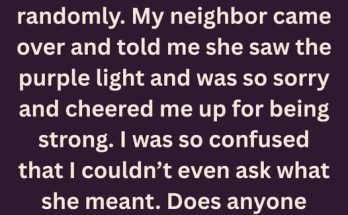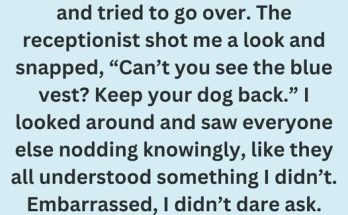Caring for a newborn is supposed to bring a couple closer. But when you’re exhausted, hungry, and invisible—sometimes all it takes is a cold, empty kitchen to show you just how alone you really are.
I always knew becoming a mother would stretch me—emotionally, physically, mentally. What I didn’t expect was how deeply it would isolate me. I believed in late-night cuddles and shared moments, in the beauty of starting a family. But instead of bonding through the challenges, I found myself feeling abandoned, unseen, and painfully hungry—both for food and compassion.
My name is Jenna. I was 31 when my son was born. That day, everything changed—and not just in the poetic, picture-perfect way they write about in parenting books. My world shrank to diapers, midnight feedings, laundry mountains, and a body that no longer felt like mine. But I was determined. I loved my baby. I would push through.
What I didn’t know was that I’d be doing it mostly on my own.
“Mom’s Coming to Help”—Or So He Said
John, my husband, was excited to bring our baby home. He promised he’d support me. And when he said his mother would come stay to help, I tried to see the good in it.
“She’ll cook,” he said. “She’ll clean. You’ll get some rest.”
I clung to the hope like a life raft. I’d always heard that it “takes a village” to raise a child. I thought—maybe this will be my village.
But that village never came.
Instead, our home became a revolving door of guests—neighbors popping by, cousins visiting for coffee, laughter echoing downstairs while I struggled upstairs, unwashed and untouched by kindness. I was healing from childbirth. I was learning how to be a mother. I was barely surviving.
And downstairs, life carried on without me.
The Night I Went Looking for Dinner—and Found Nothing
One night, after rocking my colicky baby for what felt like hours, I tiptoed out of the nursery, my stomach aching with hunger. I hadn’t eaten since breakfast.
The house was quiet. The lights were dim. The kitchen counters sparkled.
There was no food.
“Is there anything left to eat?” I asked softly.
John’s mother, without even turning around, said, “Well, you didn’t come down earlier. We figured you weren’t hungry.”
The words pierced me like ice. Not angry. Just dismissive. As if I didn’t exist.
I blinked at her, speechless.
They had eaten. Cleaned up. Laughed and talked and filled their bellies—while I soothed a newborn upstairs, running on fumes.
That night, something cracked. Not because I missed a meal, but because I realized: they didn’t think of me at all.
When the Help Hurts More Than It Helps
Over the next few days, I noticed the comments.
“She looks tired all the time.”
“The house is a mess.”
“She doesn’t really do much, does she?”
They weren’t always direct. Sometimes they came in whispers. Other times, in not-so-subtle glances. But the worst was when John repeated them.
“You’ve had weeks to get into a routine,” he said one morning. “You could at least keep things a little cleaner.”
I stood there, baby on my hip, milk-stained shirt clinging to my body, my brain too foggy from lack of sleep to even respond.
He didn’t see the problem. He only saw what wasn’t done. He didn’t defend me. He echoed the judgment.
That’s when I knew I wasn’t just tired—I was unsupported.
And I was not okay.
When Enough Is Enough
When John started calling me “lazy” and “ungrateful,” I couldn’t take it anymore. One afternoon, after another argument where he and his mother stood united, questioning my every move, I did something I never imagined I’d have the courage to do.
I packed a small bag.
I wrapped my baby in a blanket.
And I left.
I didn’t scream or slam the door. I just walked out—shaky, quiet, and completely heartbroken. I drove straight to my mother’s house, unsure what would come next, only knowing I needed to protect myself and my child.
That night, my phone rang. It was John.
“You owe Mom an apology,” he said. “She came to help. You’ve made her feel unwelcome. This is on you.”
I hung up.
Not because I was giving up—but because I finally understood: this wasn’t help. This was harm.
One Phone Call That Changed Everything
Lying in my childhood bed, my baby sleeping on my chest, I thought of someone I hadn’t considered before—John’s father.
He’d always been fair. Soft-spoken. Calm. So I picked up the phone.
When he answered, my voice shook. I told him everything. About the hunger, the isolation, the dismissal. About the criticism and the cold indifference.
He was silent for a moment. Then he said just one thing.
“Get ready. I’m coming.”
A Father Steps In — And Changes the Tone of the House
The next afternoon, he pulled into the driveway. No shouting. No theatrics. Just presence.
We returned together.
Inside, John and his mother were watching TV, carefree as ever. But when his father stepped into the room, everything changed.
He looked at his wife first.
“Enough,” he said. “Pack your things. You’re going home. They need space.”
She didn’t argue.
Then he turned to John.
“Your wife gave birth five weeks ago. She is exhausted. She’s doing the hardest job there is. And you? You’re supposed to be her partner. Not her judge. Start acting like one.”
A Marriage Begins Again — Slowly, and With Intention
It didn’t fix everything overnight. But something shifted.
John started helping—really helping. Not just offering advice from the couch, but getting up at night, learning to calm our baby, cooking simple meals, and doing the laundry without being asked.
He asked how I was feeling—not to check a box, but because he truly wanted to know.
And when his mother returned weeks later for a visit, she was changed too. She didn’t speak much. She cooked quietly. She cleaned with purpose. She offered to take the baby so I could nap.
Maybe she realized something in her husband’s words. Maybe she remembered what it felt like to be a new mom, unseen and overstretched.
Either way, the house felt different.
Healing Doesn’t Always Come Loudly
I used to think healing came with big moments—apologies shouted over rainstorms or grand romantic gestures.
But real healing, especially after emotional wounds like these, is quieter.
It’s your husband humming in the kitchen while dinner simmers.
It’s the baby asleep on your chest, your shoulders no longer tight with dread.
It’s the simple question, “How can I help?”
It’s someone seeing you—really seeing you—and choosing to step up instead of step away.
What I Learned About Motherhood, Marriage, and the Power of One Voice
There’s so much no one tells you about those first few weeks after having a baby. How invisible you can feel. How your needs disappear behind diapers and feedings. How the people closest to you can either lift you—or crush you.
But I also learned this:
- You are not selfish for needing support.
- You are not weak for saying, “This isn’t working.”
- And you are allowed to walk away from harm—even if it comes dressed as help.
Thanks to one quiet man who listened—and spoke up—I found my voice too.
And slowly, my husband found his way back to me.
Because parenthood isn’t meant to be done alone. Not the feeding, not the cooking, not the healing. Especially not the healing.



